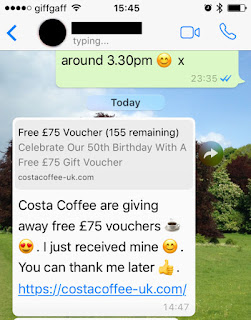If you use WhatsApp there’s a fresh new scam to be aware of.
Users are being targeted by a fraud which attempts to access their personal details via the offer of free vouchers at Costa Coffee.
The issue has been highlighted by consumer group Which?, who are warning WhatsApp's millions of users not to be fooled by the fake freebie.
The message states that to celebrate Costa’s 50th birthday the chain is giving away a free £75 Gift Voucher.
The scam even includes a clever pressure sales tactics which shows a limited amount of these prizes are left.
Once someone clicks on the link they are then asked to fill in personal details so the voucher can be sent to them.
Third party reference image
And to make things even worse it also then attempts to get WhatsApp fans to send the message to their friends and family.
Speaking to Which? a Costa Coffee spokesperson said: “Dear Customers, we’ve become aware of a scam using our name offering a £75 voucher to celebrate our 50th birthday.
“This is NOT a Costa offer.
“To get the voucher the scammers require you to share the message on Whatsapp and enter personal details. PLEASE DO NOT DO PROVIDE THIS INFORMATION – we believe it could be used for fraud purposes.”
WhatsApp scams have become increasingly common in recent months with free tickets to UK theme parks being touted across the platform.
A recent fake message to target fans of the popular app claimed to have come from Legoland with it offering 5 free tickets to 500 families.
Once users click on the link they are taken to a website which gets them to answer questions before finally asking for personal details to be entered.
The shocking scam even includes fake Facebook posts from supposed winners of tickets and a countdown clock which appears to show tickets slowly being won.
Legoland has confirmed that this is not an official post or competition from them and has warned customers to be wary of the offer.
The news of the scams comes as WhatsApp is attempting to stop the spread of fake messages across its service.
The new functionality will allow a "suspicious link" to be detected when it is sent to a user.
Mashable insisted a company representative from WhatsApp had confirmed the feature was being tested.
They said: "To protect your privacy, these checks take place entirely on your device, and because of end-to-end encryption WhatsApp can’t see the content of your messages."
The vital security feature went out to beta testers of the service on Thursday.


